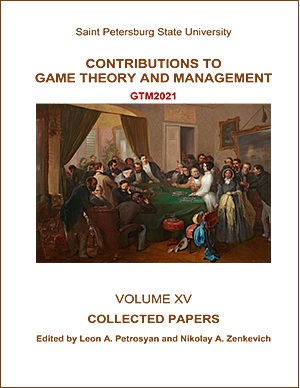Dynamic Games with Incomplete Knowledge in Metric Spaces
DOI:
https://doi.org/10.21638/11701/spbu31.2022.09Abstract
Keywords:
dynamic games, discrete time, incomplete knowledge, utility shares distributions, equilibrium states, solution trajectories
Downloads
References
Downloads
Published
How to Cite
Issue
Section
License
Articles of "Contributions to Game Theory and Management" are open access distributed under the terms of the License Agreement with Saint Petersburg State University, which permits to the authors unrestricted distribution and self-archiving free of charge.




